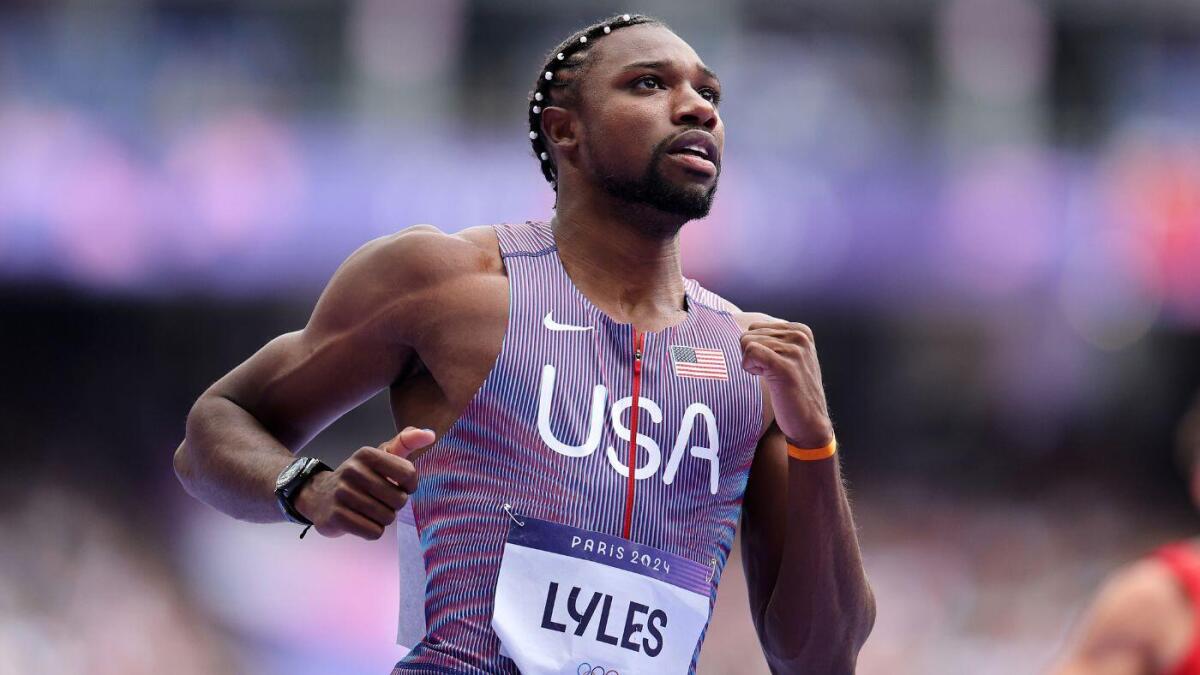The Canceled Showdown: A Detailed Examination
The Spark of Anticipation
The sports world was abuzz with excitement when Noah Lyles, the Olympic gold medalist, and Tyreek Hill, the speedy wide receiver for the Miami Dolphins, announced their plans to race. What started as a casual challenge quickly escalated into a highly anticipated event, drawing attention from fans and media alike. The race promised to be a unique spectacle, blending the worlds of track and field with American football. However, the event’s sudden cancellation left many puzzled and disappointed, sparking debates and speculations.
The Origins of the Challenge
The seeds of this showdown were planted during the 2024 Paris Olympics, where Lyles secured his gold medal in the 100-meter dash with an impressive time of 9.79 seconds. Hill, known for his swift movements on the football field, saw this as an opportunity to test his speed against an Olympic champion. The challenge gained traction, with discussions about the race distance and location—initially proposed for Times Square, later shifted to Miami. The event was set to be a crossover extravaganza, capitalizing on the star power of both athletes and the potential for massive viewership and media coverage.
The Mysterious Cancellation
The cancellation announcement was swift and consistent across various news outlets. Lyles cited “personal reasons” and “complications” as the primary factors, asserting that preparations were well underway. However, the vagueness of these explanations left room for speculation and distrust. Reports suggested that securing adequate financial backing proved difficult, hinting at deeper logistical and financial hurdles than initially acknowledged. This lack of transparency fueled the narrative that the cancellation was more than just a simple logistical issue.
Hill’s Public Skepticism
Tyreek Hill’s reaction to the cancellation was notably different from Lyles’. He publicly expressed skepticism, implying that Lyles might be hesitant to face him, potentially fearing a loss. Hill’s comments, made through various media channels, suggested he believed Lyles was backing down from a challenge he had initially embraced. This public back-and-forth added a layer of drama, transforming the cancellation into a perceived display of competitive insecurity. Hill’s response fueled the narrative that Lyles was avoiding a race he had initially promoted.
Lyles’ Performance Context
To fully understand the situation, it’s essential to consider Lyles’ recent performance. His Olympic gold medal and personal best time of 9.79 seconds solidified his status as one of the world’s fastest men. At the peak of his athletic prowess, a potential loss to a non-sprinter seemed unlikely. This context arguably strengthens Hill’s skepticism. Why would a champion sprinter, enjoying a career high, withdraw from a race against a football player unless there were legitimate, unforeseen circumstances or a genuine fear of damaging his reputation? The timing of the cancellation, so close to the planned event date, further fueled speculation.
The Broader Implications
The cancellation of the Lyles-Hill race highlights the complexities of organizing crossover events between different sports. While the potential for attracting a large audience is significant, the logistical and financial challenges can be substantial. Securing sponsorships, coordinating schedules, and ensuring fair competition require meticulous planning and a strong commitment from all parties involved. Furthermore, the incident underscores the importance of athlete branding and public perception. Both Lyles and Hill have carefully cultivated their public images, and the cancellation has impacted both. Lyles risks appearing hesitant or lacking confidence, while Hill risks appearing overly aggressive or dismissive. Managing these perceptions will be crucial for both athletes moving forward.
Unanswered Questions and Lingering Doubt
Despite the explanations offered, several questions remain unanswered. The specific nature of the “personal reasons” remains undisclosed, leaving room for continued speculation. The extent to which sponsor issues contributed to the cancellation is also unclear. The public disagreement between Lyles and Hill has created a sense of lingering doubt. While Lyles maintains his reasons were legitimate, Hill’s skepticism has resonated with many fans. The incident serves as a cautionary tale about the challenges of building hype around a unique event and the importance of transparency in addressing unforeseen complications.
A Missed Opportunity and a Cautionary Tale
In conclusion, the canceled race between Noah Lyles and Tyreek Hill represents a missed opportunity to showcase the athleticism of two exceptional athletes and bridge the gap between different sporting worlds. More than just a race, it was a spectacle built on curiosity and competitive spirit. The fallout serves as a cautionary tale for future crossover events, emphasizing the need for thorough planning, transparent communication, and a shared commitment from all involved. The speed of both athletes remains undeniable, but the race itself will remain a “what if” in the annals of sports entertainment. The incident highlights the delicate balance between hype and reality, and the importance of managing public perception in the world of sports.

